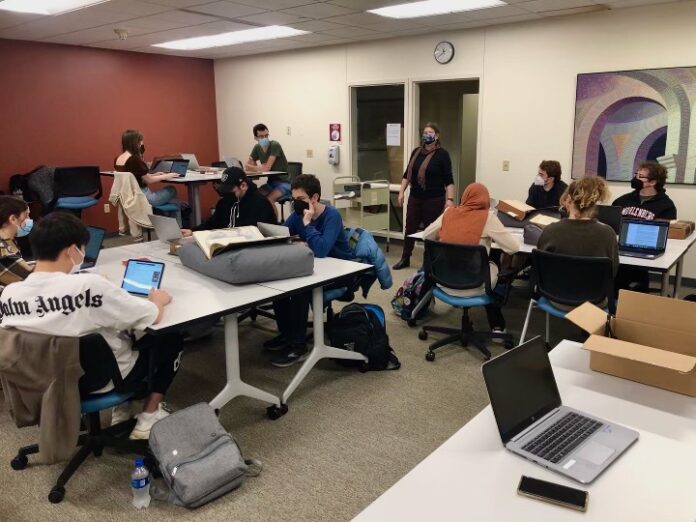
Muhlenberg College’s Trexler Library contains rows upon rows of novels, records and written scholarship that students are free to check out at any time. However, there is a section of the library that is not as widely known: Muhlenberg’s Special Collections. This curated body of work consists of school-specific artifacts along with incredibly valuable first editions, detailed illustrations and ancient papers. These treasures are sectioned off from Trexler’s primary stacks and subsequently do not garner as much attention from the student body. Muhlenberg’s Special Collections and Archives Librarian Susan Falciani Maldonado is working to change this.
Getting the materials in front of and into the hands of students is one of Falciani Maldonado’s goals for Special Collections. She touts the College’s accumulation of rare books as being “the perfect teaching collection” because its materials cover a wide breadth of subjects without delving too deep into one specific area of study. She notes that, “It allows us to show representative examples across topics… We may not have 50 editions of Hemingway, [but] we have two nice copies.”
Not all the books in Special Collections have monetary value, according to Falciani Maldonado. However, they give insight into certain moments in time. Falciani Maldonado said, “Book history intersects with industry, with literature, of course, and with history… There are things that can be gleaned from a volume that is not just the text contents.”
“Book history intersects with industry, with literature, of course, and with history… There are things that can be gleaned from a volume that is not just the text contents.”
The diversity in the value of the school’s rare books is not a deficit to the College. “I think one of the things that’s fun about having a mix of high spots and then a wide diversity of other things is that the high spots are always exciting,” said Falciani Maldonado.
Muhlenberg’s Special Collections does not have a shortage of high spots within its realm. A set of first edition Charles Dickens’ “Christmas Books,” a slew of ancient papyri, a book of poetry hand-painted and drawn by William Blake and a first edition of “The Scarlet Letter” are all pieces of ‘Berg’s rare materials.
It’s not just Muhlenberg that is aiming to take a more active, teaching-centric approach to their Special Collections. It has been a growing trend for universities to abandon the notion that their sole purpose is to preserve and protect their valuable objects. Falciani Maldonado expressed that the Special Collections community began to question this notion. “What can be gained from thinking about these as objects and putting them into the hands of students? So, the idea of doing more outreach and more classroom hands-on programming with Special Collections items is something that has been a groundswell and become best practice among Special Collections librarians.”
This thought process is what led to the evolution of the “Sacred Stories” class at Muhlenberg which is co-taught by Falciani Maldonado and Sharon Albert, senior lecturer of religion studies. It began as a course solely instructed by Albert, but Falciani Maldonado came into the picture when discussions of rare religious texts came up. The pair then decided to transform the class, and applied for an “Integrative Learning” designation. Now, students delve into the history of holy works while simultaneously studying different elements of the library.
Two students in the course, Nour Yousry ‘23 and Emily Orlich ‘24, explained how the handling of rare books in class has impacted their learning experiences. Yousry noted, “The application of rare books within a classroom setting has opened up my eyes to all the wonders that can be extracted from various literary materials. As you touch and handle these rare materials, you feel yourself time-traveling backwards into history. The material elements such as the binding of books, marble-colored pages and rough-edged papers, to the uniquely published ink on the page—the experience is truly magical, as it gives you insight to a new and unfamiliar world.”
Orlich expressed similar sentiments saying, “I think the application of rare books within the classroom has made my learning experience so much better. In a class about rare books it makes it so much more engaging and fun to actually be able to get hands-on experience with the books rather than just reading about them.”
“I think the application of rare books within the classroom has made my learning experience so much better. In a class about rare books it makes it so much more engaging and fun to actually be able to get hands-on experience with the books rather than just reading about them.”
If students want a chance to experience the Special Collections themselves, the courses “Books and Their Readers” and “Printmaking 1” are taught in tandem with each other next semester and utilize the rare books in Trexler. Students can also make an appointment with Falciani Maldonado through email to view these texts. More information about the Muhlenberg’s archives is posted to the Instagram account @bergspecialcollections.
Katie is a Media & Communication and Political Science double major in the class of 2024. When she's not working on the paper you can find her blasting Taylor Swift, reading Jane Austen, or crying over Little Women (2019).






















